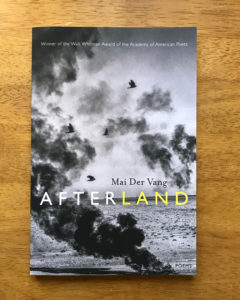
[Afterland] reminds us what a distinctive instrument the human imagination is…Afterland works its wonders with an intentionally rationed vocabulary, its counters combined and recombined in poem after poem…The style creates an atmosphere of impending marvels, and many of Vang’s poems perform, in words, the transformations that they describe…[Afterland] is among the most satisfying débuts by an American poet in some time.
—The New Yorker
…From the first page, the writing is visceral and potent…Throughout, Vang keeps the energy ratcheted up to the tightest turn of the wrench. VERDICT An especially accomplished debut—it won the 2016 Walt Whitman Award of the Academy of American Poets, a first-book publication prize—this is important reading.
—Library Journal ★ Starred Review
…Vang deftly probes the tumultuous history of the Hmong, from the melodic myths of the ancients and the long-hushed horrors of war to the excruciating expense of exile…Yet, amid bullets and bees, cyanide and stars, humpbacks and harvests, Vang imbues her imagery not only with loss but also with the remarkable resilience and crystalline spirituality of Hmong lore and language. “Ask me to build our temples / So rooted, so stone, we won’t ever die out,” Vang writes. With this luminous, indelible volume, she’s already built one.
—Booklist ★ Starred Review
…Vang digs beneath the chaos of war, searching the very conception of home for any familiar dimensions…her lines blaze with a distinct and vivid imagism…While many of her images ring clear in direct, simplistic tones, Vang is not scared of the murkiness of the experimental. In several poems, the language leaps with surrealist impressions that at once deepen and obscure the poet’s searching tenor…These semantic fireworks color the collection’s cooler, more settled truths. But it is the latter, the more subtle denouements of Afterland that linger in the mind like smoke, what Vang describes as “the sense/ of an answer.”
—Shelf Awareness ★ Starred Review
…Mai Der Vang’s the historian of her ancestors from a burned world…Nothing is engineered or manipulated — line after line flow like a satin ribbon burning at each end with terrible truths…This writer makes it happen now with powerful indictments and reprisals in language where, after reading, nothing will ever be the same. This is a blazing book with lyrics that aspire to Mai Der Vang as a major luminary.
—Washington Independent Review of Books
…[S]inewy and unflinching debut…Vang explores the depths of her inherited trauma…and she shares the experience of the Hmong diaspora by chronicling the physical displacement of her people and a deep and reverberating spiritual disruption. Vang suffuses her poems with unnerving details of strife, which her attention to emotion and texture keep from feeling lifeless…(Apr.)
—Publishers Weekly
Afterland’s voice seems to transmigrate, riding the trance of memory from one image to the next. . . . Vang’s work moves in the realms of ecstatic appeal where meaning is revealed cumulatively. Her ambient revelations read more like incantations. . . . [She] tumbles headlong into the realms of memory and dream, expertly crafting fine and elegant passages on her way.
—LA Review of Books
In her poems, specters follow refugees like heirlooms, as painful and haunting as they are cherished; mourning and memory are the watchwords for dispossession …she writes about prehistory, loss, and the importance found in remembering it…Vang…succeeds in capsulizing her ancestors’ war-torn identity and consequent diaspora. We now know that traumas are genetically heritable—they’re not isolated instances but cascades of generational grief. What can’t be erased can be overwritten, but only if the pen is bold enough. Vang’s certainly is.
—The Paris Review
…Vang bears witness to the Secret War in Laos…Perhaps in the literature of witness the intent is psychological and political and historical simultaneously, the desire to grieve and to heal and to protest and to honor. And in these moving and deft poems by Mai Der Vang, the intertwined landscapes of time, place, and self are dreamlike and discursive, evolving and devolving, imbued with memory.
—Los Angeles Review
Vang’s glitteringly fragmented, endlessly ramifying verse in Afterland does not yield easy answers, but its depiction of history as a gaping mouth whose exhalations condense on the undersurface of the floor of the present moment is a chilling and necessary lesson for our times.
—The Rumpus
Vang’s voice is uniquely mature for a debut collection, with undeniable authority over her language. Seductive in its other-worldliness—though threatening too—Afterland is not a rural homespun collection of middle America…The language will haunt you, the broken images will attach themselves to the back of your mind with their sharp, crooked edges.
—Frontier Poetry
MORE REVIEWS:
